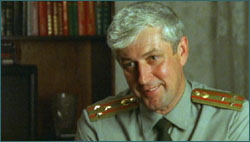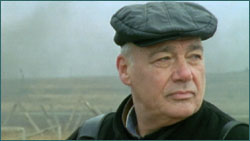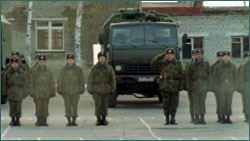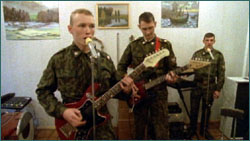|
 |
 |
|
|  Colonel Yuri Petrovsky
Colonel Yuri Petrovsky
|
The Director's Story:
Behind Russia's Nuclear Front Line
by Leslie Woodhead
"You're the first foreigners I've ever met," said Colonel Yuri Petrovsky.
It was hard to believe that this urbane, 47-year-old man with
silvery hair and a gold tooth could have remained so isolated throughout his
life. I found it especially hard at that moment, sharing a tasty picnic
barbecue with the colonel and his family beside a lake not far from the River
Volga.
But Yuri Petrovsky is a very special kind of soldier. He's a roketchik,
one of an elite squad of highly trained individuals who have their fingers on
Russia's nuclear keys. For 22 years, the colonel has stood guard on Russia's
nuclear front line, ready to unleash Armageddon at a moment's notice. As we
clinked vodka glasses and toasted "friendship," he left me in no doubt that
he's still just as ready to do his awesome job.
During the long years of the Cold War, Colonel Petrovsky's isolation from all
foreign contacts was an inevitable requirement of his highly sensitive and
ultra-secret role. It made our relaxed encounter now, recorded freely by a
Western film crew, all the more remarkable. It was just one moment in what, for
me, was a startling insight into the closed world of Russia's largest missile
base. For a few weeks recently, we were able to film the day-to-day life of the
men and women who command Russia's most sophisticated Intercontinental
Ballistic Missile, or ICBM—the TOPOL M, designed to elude America's proposed
missile shield.
Gaining access
For me, the journey to the heart of Russia's nuclear forces really began three
years before in an unlikely place—inside America's biggest missile base, in
Cheyenne, Wyoming. I made a film for the BBC with the American missileers at
F.E. Warren Air Force Base, following a group of new recruits as they went "on
alert" in the launch control centers deep under the western prairies. When the
film was finished, I found myself wondering how the long-standing enemies on
the other side of the world in Russia pursued their fearful mission. It seemed
unlikely that I'd be able to secure the kind of access I'd gained in Wyoming,
but I decided to give it a try.
 Vladimir Pozner
Vladimir Pozner
|
|
I did have a secret weapon of my own: Vladimir Pozner. Pozner is Russia's most
celebrated and respected television correspondent, and I've known him for
several years. I had made a film about him for the BBC, exploring his
extraordinary life. He was raised in New York in the 1940s, taken to Moscow in
the early `50s by his Russian father, made a career as a journalist in the
Soviet Union, and became a reporter for the West on Mikhail Gorbachev's reforms
in the 1980s. Pozner, who is totally bilingual in the accents of his native New
York and of Moscow, re-established his American connections alongside Phil
Donahue after the collapse of Communism in the 1990s, and is now the anchor for
Russia's most widely watched public affairs program. I sent Pozner a cassette
of the American missile film and asked him to look into the possibility of
doing a parallel film with the Russian missileers. I didn't have much
hope.
Pozner promptly got back to me with startling news. Top generals in Russia's
Strategic Missile Forces had looked at the American film and felt that they
could open up access to me for a similar program. Would I go to Moscow to
discuss things in more detail?
The general's list
At the headquarters of Russia's Strategic Missile Forces just outside Moscow, I
drove past a replica missile modeled on the rockets installed by the Soviets in
Cuba in the early 1960s, pushing the world to the brink of nuclear war. With
Pozner and consultant Reggie Nadelson, I was due to meet Missile General Ivan
Khomeinko. The general is a warm and expansive man who kissed Nadelson's hand
and then escorted us round a museum of Russia's nuclear history. But when it
came to those detailed talks about a film, he was focused and decisive. "When
do you want to come, and what do you want to see?" he asked. We gave him a list
of sequences closely related to the material we'd filmed with America's
missileers. The general made notes and said this should all be possible. We
survived the first of many banquets and many toasts, and agreed to be in
touch.
|  These days, the much-vaunted
roketchiki face the same funding pressures as the rest of the Russian
military.
These days, the much-vaunted
roketchiki face the same funding pressures as the rest of the Russian
military.
|
I was aware, of course, that Russia's roketchiki had their own reasons
for this opening of closed doors. With the terrible reports of collapse within
Russia's military, which included the humiliation of the army in Chechnya and
the trauma over the loss of the Kursk, Russia's flagship nuclear
submarine, the roketchiki were anxious to show the outside world that
the missile forces were still in good order and in a position to match their
superpower rivals in the United States.
But Pozner made me aware of other, more political issues. There's a ferocious
struggle going on inside the Russian military about funding and power. The
continuing economic crisis in the country means that the fight for budgets and
control goes right to the top. As Pozner told me: "The defense minister, a
former missile commander, insists that Russia must preserve its nuclear missile
capability, the only remaining guarantee of superpower status. The Chief of the
General Staff argues for deep nuclear funding cuts to modernize the
hard-pressed conventional forces. President Putin must decide." In this
context, it was clearly important for Russia's missile forces to stake their
claim, and clearly they hoped our film might help with that campaign. But
Pozner also told the general at our first meeting that we would insist on full
access, and that any attempt to control our filming would mean the end of the
project.
A few weeks later, Pozner sent me a list of suggested ingredients for a film
he'd just received from General Khomeinko. It included everything I'd asked
for, some things I didn't want, and some surprises. I rejected some obvious
public relations stuff, but I was intrigued to hear about the roketchiki
song and dance troop. I was certain it would be a long way from the cowboy
style of Cheyenne Wyoming. I told Pozner we were coming.
 A new generation of roketchiki relaxes
off-hours.
A new generation of roketchiki relaxes
off-hours.
|
|
Meeting the roketchiki
With Pozner, Nadelson, and a film crew, I flew from Moscow to the city of
Saratov on a beautiful autumn day. We were all relieved to have won a week-long
battle with customs at Moscow's Sheremyetovo airport to import our film
equipment. Saratov, on the Volga about 500 miles southeast of Moscow, is a
handsome place, and the officers who came to collect us were welcoming though
visibly nervous. If this film went wrong, obviously it would not be good for
them. After considerable uncertainty, we'd been invited to film at Russia's
biggest missile base, about 30 miles from the city. We rattled across the
barren countryside in an aged bus, not knowing what to expect.
Journey's end for the filmmakers proved to be the guest house of a huge chicken
farm just outside the base. Our living quarters were spotless, comfortable, and
soakingly overheated despite the mellow autumn weather. The cackling of a
million chickens hardly penetrated the double glazing of the room I shared with
the assistant cameraman. It was hard to accept that we were on the doorstep of
a mighty nuclear arsenal.
Continue: Inside the base
The Director's Story |
False Alarms on the Nuclear Front
Global Guide to Nuclear Missiles |
From First Alert to Missile Launch
Resources |
Transcript |
Site Map |
Russia's Nuclear Warriors Home
Search |
Site Map |
Previously Featured |
Schedule |
Feedback |
Teachers |
Shop
Join Us/E-Mail |
About NOVA |
Editor's Picks |
Watch NOVAs online |
To print
PBS Online |
NOVA Online |
WGBH
© | Updated October 2001
|
|
|
|